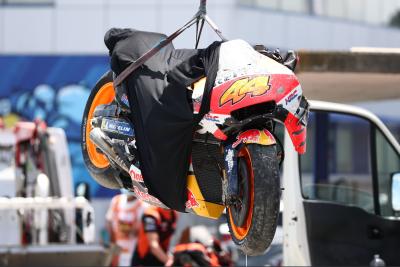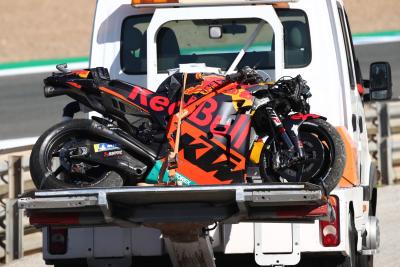MotoGP riders expect changes to run-off areas at Jerez
Air fences, especially at Turn 7, played a vital role in allowing some MotoGP riders to walk away from big accidents during the Spanish MotoGP weekend at Jerez.
But air fences are far from a perfect solution to shorter-than-needed run-off areas. There is still a risk of the bike following the rider into the airbag, or the possibility of a rider sliding under the airfence and into the tyre barrier.
Eight-time world champion Marc Marquez tested the Jerez air fences twice during the weekend, requiring hospital scans after a big Saturday fall at Turn 7 - his first accident since returning to MotoGP action.
"It was a big crash, especially the impact against the air fence was at high-speed, but thanks to the air fence I’m here."
Fortunately @marcmarquez93 walked away from THIS!
— MotoGP (@MotoGP) May 1, 2021
The Spaniard suffered a high speed crash at Turn 7 in FP3! #SpanishGP pic.twitter.com/kN1eBmft8C
Repsol Honda team-mate Pol Espargaro later fell at the same corner, while Marquez then made contact with an air fence again – albeit much more lightly - when he had another fast lowside in morning warm-up at Turn 4.
Celestino Vietti had brought out red flags in the earlier Moto2 session to repair a damaged air fence, again at Turn 7, which was later the scene of a big fall for Jake Dixon.
Some riders, such as world champion Joan Mir and Aleix Espargaro, felt it shouldn't take a big accident or injury for changes to be made.
"I think that first of all, the runoff areas are not enough in this track for a MotoGP bike, not in turn 7, not in turn 1, not in turn 5, not in turn 8, 9, 10. We are really on the limit in this position," Mir said.
"But this is the same story as always. They don’t change until something happens."
"This makes me very angry because I don’t know why we have wait for two crashes to talk about safety," added Espargaro, referring to Saturday's Turn 7 falls for his younger brother Pol and Marquez.
"We say it many times, that here the barriers are very close, we know it and at all the corners that nobody crashed at also. So looks like we always have to wait for a crash to start to take it more seriously.
"Yes, we know perfectly Turn 7, but nobody crashed in corner 12 but in corner 12 we have three metres of runoff area and it's a more than 200kph corner."
But changes do look to be in the pipeline, with Mir expecting expansion of the Jerez run-off areas to be gradually phased-in over the next few years.
"In the Safety Commission we spoke about that. I think that they will start to make it better, but for next year I think that they will change maybe one corner or two, then in the next year they will continue changing things.
"We have to improve the safety in this track for the MotoGP bike."
But Jerez certainly isn’t alone in that regard, the ever-increasing performance of grand prix machines causing riders to breach previously 'safe' gravel traps.
"Jerez has some places where the runoff is not enough for the speed of MotoGP now, but I think a lot of different tracks during the season are more-or-less at this level," said nine-time world champion Valentino Rossi, who first raced a grand prix bike at Jerez in 1996.
"It's always better when you see the rider stop before the end of the run-off area because it's very dangerous. And I think that in the Safety Commission they speak about the runoff areas.
"This is always very important and we need to improve, especially because the performance of the bikes, tyres and brakes are always more. So you need more runoff area."
"The problem is that Jerez is a safe circuit, sincerely it is, but MotoGP is going faster and faster with the wings, the tyres, everything," agreed Espargaro.
"For example corner 7, in the past you brake in Turn 6, it's a very slow corner, you accelerate and you just gain a little bit of speed [by turn 7].
"But now from Turn 6 to 7 you gain 150km/h! It's unbelievable because we have a lot of downforce, so the circuits are getting smaller and smaller due to the speed we are using."
Which begs the obvious question, should it be the MotoGP bikes that change, rather than the circuits?
"This is the best class in the world, Aprilia is using the technology we develop here for the street bikes, you can see in the RSV1000 the wings, things on the electronics also. We are developing here and put there," said Espargaro.
"Also the street bikes every time have more and more power, so the bikes are fast and the level of the category is very high so it's difficult to control that.
"The circuits have to adapt, just as we the brands and the riders have to also adapt to the new technology. Jerez is a very good track, but maybe we have to think about it and modify some places."
But eight-time world champion Marquez thinks there is a limit to how fast a MotoGP bike should be allowed to go and called into question some recent technical developments, specifically the acceleration-boosting holeshot/ride height device.
"Every time we’re faster, it’s normal we’re in MotoGP and the manufacturers always try to have faster bikes. And if the rules permit, the riders want to have the fastest bikes. This means that then the run-off areas get smaller. Not only Jerez, many circuits on the calendar, the run-off areas become small," Marquez said.
"I already said a bit in Portimao, but the fact we have the holeshot [ride height device] on the straight, going lower on the rear, the next one will be to lower the front [during the race]... Every time it’s something different.
"I agree, manufacturers improve. And they try to find the best. But in the end the riders need to have a position.
"[Do] we need the holeshot? [Do] we need to be at 362kph at the end of the straight in Qatar. We don’t need this... If we continue in that direction all the circuits in the world will be too small in the run-off areas."
Pramac Ducati's Johann Zarco set a new all-time MotoGP top speed record of 225.1 mph (362.4kph) in Qatar but that could well be broken when MotoGP returns to Mugello - usually the fastest straight of the season - later this month, having skipped the venue in 2020 due to Covid.




![Johann Zarco, LCR, Honda RC213V, 2024 San Marino MotoGP, Misano, action [Gold & Goose]](https://cdn.crash.net/styles/thumbnail/s3/2024-09/GnG_1166323_HiRes.jpg?itok=vpgrU7Q4)

![Jack Miller, KTM Factory Racing, KTM RC16, San Marino MotoGP, Misano, action [Gold & Goose]](https://cdn.crash.net/styles/thumbnail/s3/2024-09/GnG_1167624_HiRes.jpg?itok=iz7mA4EQ)


![Fabio Quartararo, Monster Energy Yamaha Racing, Yamaha M1, 2024 MotoGP, Misano Test, action [Gold & Goose]](https://cdn.crash.net/styles/thumbnail/s3/2024-09/GnG_1168928_HiRes.jpg?itok=fcYSole_)
![Toprak Razgatlioglu, ROKiT BMW Motorrad, BMW M 1000 RR, Magny-Cours, WorldSBK [Gold & Goose]](https://cdn.crash.net/styles/thumbnail/s3/2024-09/GnG_1165133_HiRes.jpg?itok=GD5SVNVG)

